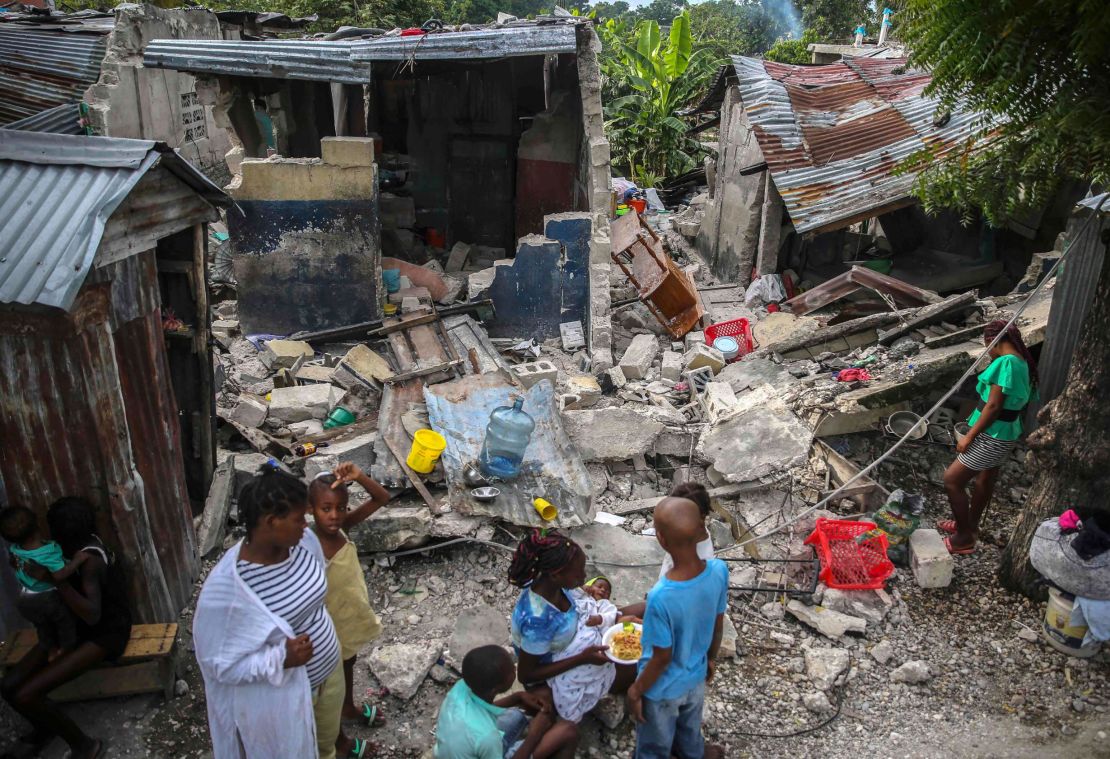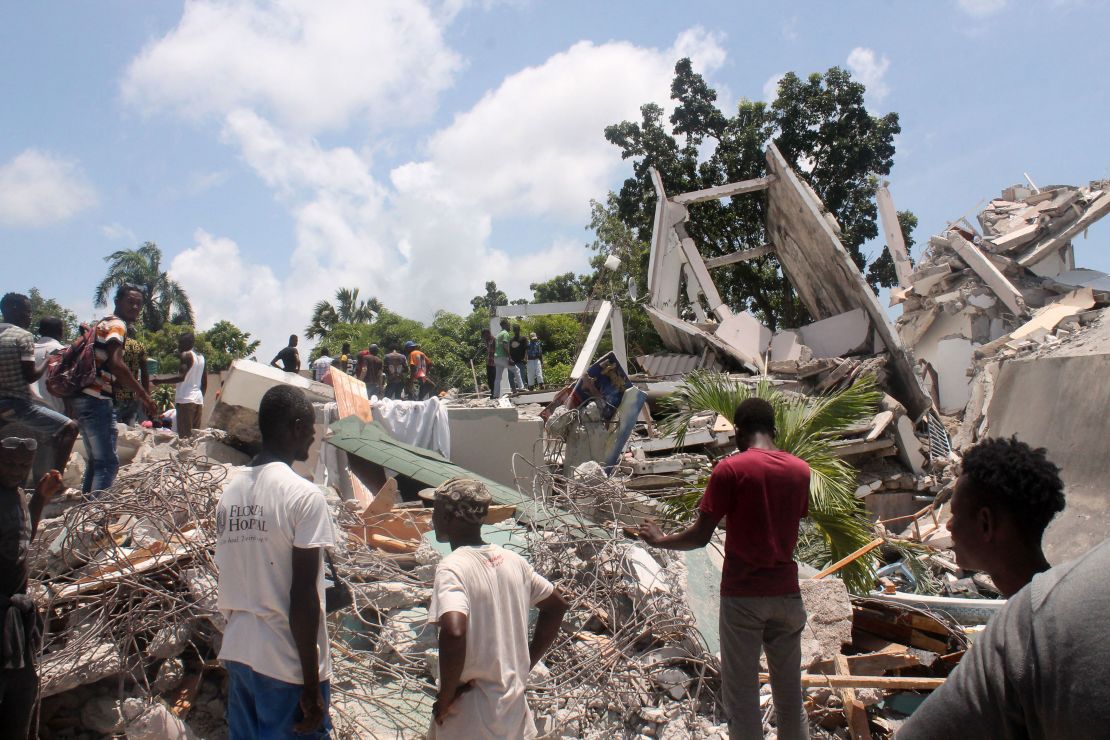The Haitian government declared a state of emergency after a 7.2-magnitude earthquake struck the country Saturday, leaving at least 1,297 people dead and more than 5,700 injured, according to the country’s civil protection agency.
Of the 1,297 fatalities, 1,054 are in the South administrative region, 119 are in Grand’Anse, 122 are in Nippes and two are in the Northwest region, the civil protection service reported on Sunday.
The quake destroyed 13,694 homes and damaged another 13,785, officials from the agency said. The destruction has also pushed hospitals to the brink and blocked roads that would carry vital supplies.
“When it comes to medical needs, this is our biggest urgency. We have started to send medications and medical personnel to the facilities that are affected,” Prime Minister Ariel Henry said. “For the people who need urgent special care, we have evacuated a certain number of them, and we will evacuate some more today and tomorrow.”
The state of emergency is in effect for the Western Department, Southern Department, Nippes and Grand’Anse.
The earthquake struck at 8:30 a.m. about 10 kilometers (6.2 miles) deep, with its epicenter about 12 kilometers (7.5 miles) northeast of Saint-Louis-du-Sud in the southwest part of the country. The location was about 96 kilometers (60 miles) west of the disastrous 7.0-magnitude earthquake in 2010 that killed an estimated 220,000 to 300,000 people.
Saturday’s quake was far less damaging than the one in 2010. A United Nations reconnaissance mission to the affected areas found “less significant damages than initially expected,” the UN Office for the Coordination of Humanitarian Affairs said Sunday.
“The most urgent humanitarian needs are expected to be linked to the provision of medical assistance and water, sanitation and hygiene,” the organization said.
Amethyste Arcelius, an administrator at Immaculate Conception Hospital in Les Cayes, told CNN on Sunday that he was expecting a massive wave of victims, including many from the city’s outer areas who were not able to travel Saturday, or who were too afraid of further aftershocks to try to seek medical help.
“We are starting to receive help from NGOs and from the government, but it’s far from enough. We desperately need x-ray film,” Arcelius said.
The hospital currently has 500 earthquake victims, many with broken feet and limbs, as well as head injuries.
The earthquake is just the latest challenge for the struggling country, which is still dealing with fallout from the 2010 quake. The assassination of President Jovenel Moïse last month, which has not yet been solved or properly explained, has added further instability to a country in crisis.
“We’re concerned that this earthquake is just one more crisis on top of what the country is already facing – including the worsening political stalemate after the president’s assassination, Covid and food insecurity,” Jean-Wickens Merone, a spokesman with World Vision Haiti, said in a statement.
In addition, Haiti is likely to experience high winds and heavy rain from Tropical Storm Grace on Monday into Tuesday, CNN Meteorologist Haley Brink said. That rain could lead to flooding and mudslides, furthering complicating the recovery efforts.
The entire coast of Haiti is under a tropical storm watch, meaning tropical storm conditions are possible within about 48 hours, according to the National Hurricane Center.
“I am worried about the upcoming storm as it can complicate the situation for us,” said Jerry Chandler, head of Haiti’s civil protection agency.
Videos offer glimpse of destruction
In photos: Deadly earthquake devastates Haiti
Videos posted on social media offer a glimpse of the widespread destruction after the earthquake. One from Les Cayes shows a street strewn with rubble and what is left of a number of buildings. Dust fills the air.
A man in the video said that he was lucky that the building he was in did not collapse, but many other houses in the area did.
“There are a lot of wounded on the street,” he said.
Eveline Dominique Cherie, a UNICEF worker from Les Cayes, told CNN Sunday the earthquake was so strong, “the house shook without stopping.”
“I had to rush my children out of their room into the street. Happily, it didn’t fall. In the moments afterward the street was crowded with people who had fled their homes, injuries everywhere, so many collapsed houses,” Cherie said.
One hospital in the southern city of Jeremie said it is overwhelmed with patients and has set up tents in its courtyard.
“There are a lot of people coming in – a lot of people,” an administrator at Hôpital Saint Antoine told CNN. “We don’t have enough supplies.”
Merone, the World Vision Haiti spokesman, said he was in Port-au-Prince, about 160 kilometers (100 miles) from Saint-Louis-du-Sud, during the earthquake. He said the shaking there lasted “more than five to ten seconds,” and both sides of his house were shaking.
A 5.2-magnitude aftershock hit later Saturday morning about 20 kilometers (12.4 miles) west-northwest of Cavaillon, Haiti, according to the USGS. That was followed by several more, including a 5.1-magnitude aftershock at about noon.
A tsunami threat that had been issued for the region has passed, according to the US Tsunami Warning System.
Since June, armed gang violence has cut off some areas affected by the quake, making the aftermath a logistical challenge, Jacqueline Charles, Caribbean Correspondent for the Miami Herald, told CNN.
“This is a country that doesn’t have access to helicopters, other than what the United Nations has. So logistically this is a huge challenge,” Charles told CNN’s Fredricka Whitfield.
Prime Minister urged Haitians to band together

Henry, the Haitian Prime Minister, told CNN from Les Caye Sunday that he saw a lot of destruction and suffering, but also resilience.
Haiti’s hospitals sustained damage and a mobile hospital will soon be established to assist the wounded, Henry said. And now, as the tropical depression approaches, Henry said efforts are in place to help the most vulnerable.
“We’re trying to move fast and we’re trying to get people in the most secure area,” Henry said. “We’re still looking for spots for the displaced people.”
Henry arrived at Grand’Anse on Saturday evening to assess the extent of the damage and better coordinate the government response, he said in a Twitter post.
“Resources have been mobilized since this morning to provide aid and assistance to the victims of this devastating earthquake,” he added.
Henry urged Haitians to band together in solidarity.
“I offer my sympathies to the relatives of the victims of this violent earthquake which caused several losses of human lives and property in several geographical departments of the country,” Henry tweeted.
“I appeal to the spirit of solidarity and commitment of all Haitians, in order to form a common front to face this dramatic situation that we are currently experiencing,” another tweet read.
Martine Moise, the former first lady of Haiti, said her heart “hurts” after receiving news about the earthquake.
“The initial information that I have received from Grand’Anse is heart-wrenching,” she said. “It hurts my heart for the kids, the mothers, the elderlies, the handicaps, my friends, and all the victims of this earthquake.”
“My brothers and sisters, we have to put our shoulders together to come together to demonstrate our solidarity. It is our togetherness that makes up our strength and resilience. Courage, I will always be by your side,” Moise added.
US and other countries offer aid

The US Coast Guard is sending resources to help, according to a Sunday news statement from the USCG.
The Haitian government requested the assistance, and the Coast Guard said it will help in transporting medical personnel and supplies as well as transporting critically injured citizens to Port au Prince facilities so they can receive a higher level of care, the statement said.
On Sunday, Deputy Secretary of State Wendy Sherman said in a statement: “The United States is already putting resources in place to support Haiti’s emergency response and assured Prime Minister Henry the United States remains a close and enduring friend to the people of Haiti.”
In a statement on Saturday, US President Joe Biden said he was “saddened by the devastating earthquake.”
“We send our deepest condolences to all those who lost a loved one or saw their homes and businesses destroyed,” the statement said. “I have authorized an immediate US response and named USAID Administrator Samantha Power as the senior US official to coordinate this effort.”
Power said on Twitter Saturday night she authorized the deployment of a USAID Disaster Assistance Response Team to Haiti and is coordinating with the Haitian government to assist the country.
The Red Cross’ emergency response system has been activated and the organization is “identifying urgent needs on the ground,” American Red Cross spokeswoman Katie Wilkes said.
Doctors Without Borders/Médecins Sans Frontières (MSF) is preparing to receive patients at Tabarre Hospital in Port-au-Prince, MSF Commucation Adviser Tim Shenk said.
Several Latin American countries said they also were preparing to support Haiti.
Chilean President Sebastian Piñera said on Twitter Saturday his government has contacted Haitian authorities and is preparing to send humanitarian aid. Mexico President Andres Manuel Lopez Obrador also said on Twitter he has ordered the National Coordination of Civil Protection and other ministries like Foreign Affairs, Navy, and Defense to prepare help “immediately.”
The Foreign Ministry of Panama announced it was preparing to send humanitarian aid soon and in the Dominican Republic, President Luis Abinader said he gave instructions to the foreign minister to call the Haitian counterpart to “facilitate any help within our possibilities.”
Colombia’s President Ivan Duque said the Air Force will be deployed to Haiti on Sunday carrying a team specialized in search and rescue.
“It will be 18 tonnes of equipment to fulfill their mission: save lives,” he said in a Saturday tweet.
Other countries including Argentina, Peru, Ecuador and Venezuela also expressed their support for Haiti.
CNN’s Amir Vera, Susanna Capelouto, Caitlin Hu, Elizabeth Joseph, Eric Levenson, Brandon Miller, Florencia Trucco, Michelle Velez, Lionel Vital and Theresa Waldrop contributed to this report.















































